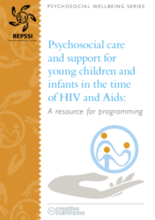The triple effects of HIV, poverty and conflict have created an unprecedented crisis across eastern and southern Africa. As a result, a growing number of babies and young children have lost traditional child protection mechanisms. Millions of babies and young children who have been adversely affected by this loss are now more vulnerable to neglect and various forms of abuse. Nevertheless, programming efforts to mitigate the impacts of these vulnerabilities and to address the psychosocial needs of these children remain largely overlooked.
This publication is offered as a resource for programme staff in organisations that work with babies and young children (or their parents or caregivers) in the context of HIV, poverty and conflict. It comprises a series of detailed, issue-based chapters that present programme guidance at household and community levels. It is a logical reference, with clear definitions of technical jargon and explanations of psychosocial support models. Discussions cover a full range of psychosocial support issues such as loss and bereavement, abuse, resilience, communication, play and counselling. Significantly, this paper frames each component of the psychosocial support focus is within the wider framework of child development. This conceptual linking provides a platform to focus very specifically on the psychosocial needs of infants and young children.
©REPSSI

